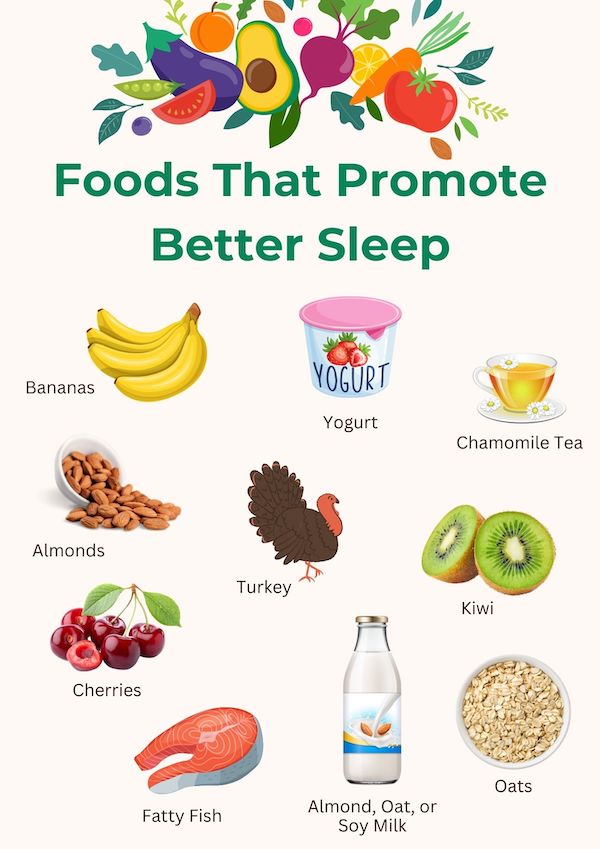
Have you noticed that as you age, good sleep becomes more and more elusive? For Kevin and me, achieving consistent and quality sleep has been our ongoing challenge. This realization has led us to experiment with various strategies to figure out how to get better sleep. This includes being more mindful of our eating habits and recognizing the intimate connection between what we consume and the quality of our sleep.
In a previous article, I talked about learning to be in my own body and listening to my body’s signals. Learning to be in tune with yourself and your physical body is so important to sleep. When Kevin and I became more health conscious, one of the first things we had to acknowledge was that food plays a pivotal role in our sleep patterns and our quality of sleep.
Through the trial and error of this process, we’ve become meticulous data gatherers, observing how our bodies react to different foods. If a particular food induces discomfort, or bloating, or prompts a midnight bathroom visit, we swiftly make adjustments to our diet.
A restful night’s sleep is not just a luxury; it’s an essential pillar of overall well-being. In this article, we explore a list of foods that help you sleep better. Let’s unlock the secrets hidden in our diet and pave the way to better sleep and sweeter dreams.
1. Bananas
This sh*t is bananas, B-A-N-A-N-A-S!
I used to hate eating bananas. They’re definitely not the most delicious fruit out there, but you know what? They do a phenomenal job in promoting relaxation and better quality sleep.
This modest source of magnesium and vitamin B6 helps to support a calm state of mind, making it easier to unwind before bedtime. Magnesium helps regulate neurotransmitters, while vitamin B6 aids in converting tryptophan into serotonin—a neurotransmitter that fosters relaxation.
This combination of magnesium and vitamin B6 makes bananas an excellent choice for those looking to enhance sleep quality. So if you’re looking for a healthy nighttime snack, bananas can now be your go-to.
2. Almonds
Almonds are another great choice for snacks! There are many health benefits to eating almonds, but one of the best ones that we learned about is its ability to help you sleep. Rich in magnesium, melatonin, and tryptophan, almonds offer a trifecta for sleep regulation. Including a small handful in your evening snack provides a natural boost of melatonin, signaling your body to wind down.
3. Cherries
Who knew that cherries could also help in regulating sleep patterns and improve sleep quality? Not only are they a tasty snack, but cherries, particularly tart cherries, are rich in melatonin and antioxidants. This means that they offer a dual benefit for sleep!
The antioxidant part of this delicious fruit may help reduce inflammation and oxidative stress, promoting an environment conducive to restful and more relaxing sleep. Consuming cherries or tart cherry juice may enhance sleep duration and regulate sleep patterns.
4. Turkey
If you’ve ever had a traditional Thanksgiving meal that includes turkey and all of the wonderful sides, you know that it induces an immediate food coma.
That’s because turkey is rich in tryptophan, an amino acid that plays a crucial role in the production of serotonin and melatonin. This means that not only is it a lean source of protein and great for a balanced meal, but it also contributes to relaxation and sleep! Who knew!
5. Fatty Fish
Fatty fish, such as salmon and mackerel, provide omega-3 fatty acids and vitamin D, linked to improved sleep quality. We all know that salmon is a popular and healthy meal option. But what makes it great is the sleep-supporting properties of salmon. Incorporate fatty fish into your diet for a nutrient-packed dinner supporting a good night’s sleep.
6. Oats
Oats, a complex carbohydrate with a low glycemic index, promote a steady release of serotonin. This, in turn, aids in the creation of melatonin, the hormone responsible for regulating sleep. A warm bowl of oatmeal before bedtime can be a soothing and sleep-inducing option. But you can have oats at all times of the day as a healthy option.
If you don’t have a lot of time for cooking or meal prepping, overnight oats is an easy meal that can be assembled quickly. Just put the ingredients in a jar or container, pop it into the fridge overnight, and viola – you’ve got breakfast or a snack!
7. Yogurt
Yogurt not only offers calcium, which supports melatonin production, but it also contains probiotics. These beneficial bacteria may positively influence gut health, which has been linked to improved sleep. Opt for plain, low-sugar yogurt for maximum benefits, and if it’s a little too plain, you can always add some granola or fruits!
8. Kiwi
Kiwi, a nutrient powerhouse with vitamin C, antioxidants, and serotonin, contributes to enhanced sleep quality. Its fiber content aids digestion, reducing discomfort that may disrupt sleep.
9. Warm Milk, Almond Milk, or Soy Milk
Warm milk provides a comforting ritual before bedtime due to its tryptophan content which contributes to the synthesis of serotonin and melatonin. This means that it can support your transition to bedtime with relaxing properties and improved quality sleep. But if you’re lactose intolerant like me, don’t worry, almond milk or soy milk are great alternatives!
Almond milk is a plant-based milk alternative that is rich in magnesium and promotes relaxation and better sleep quality. Soy milk is another plant-based alternative that can be part of a sleep-friendly diet. Soy products contain tryptophan, an amino acid that serves as a precursor to serotonin and melatonin, both of which contribute to sleep regulation.
10. Chamomile Tea
A warm cup of chamomile tea before bed is one of the best things you can do for your body. Chamomile tea is known for its mild sedative properties and contains antioxidants like apigenin, an antioxidant that promotes muscle relaxation and sleepiness. The calming effects of chamomile can help ease anxiety and prepare your body for a peaceful night’s sleep!

